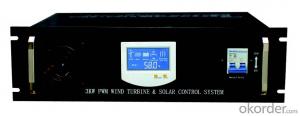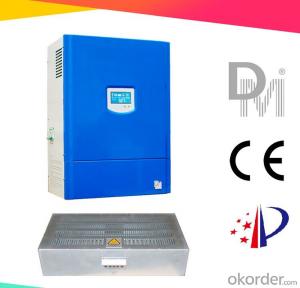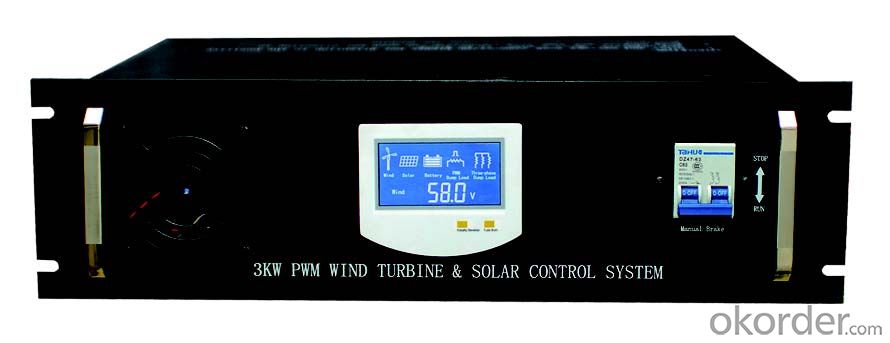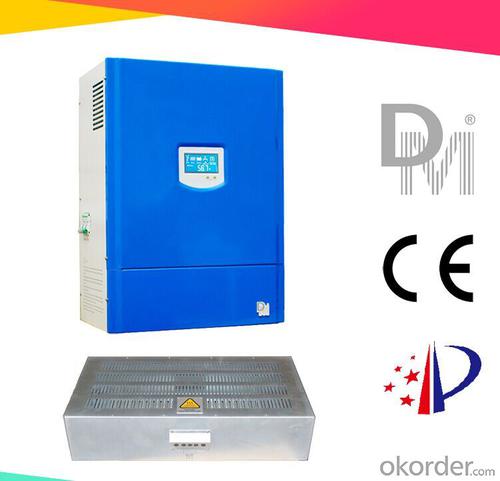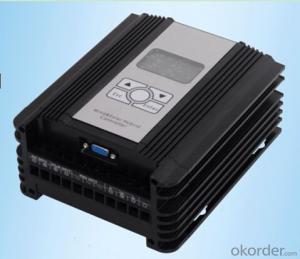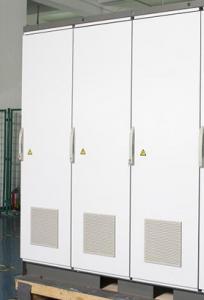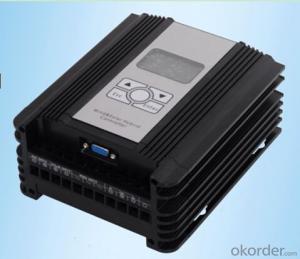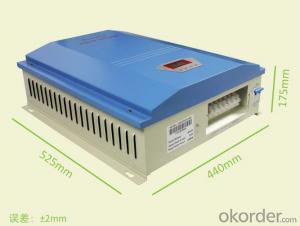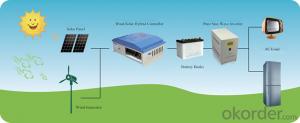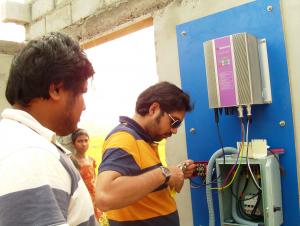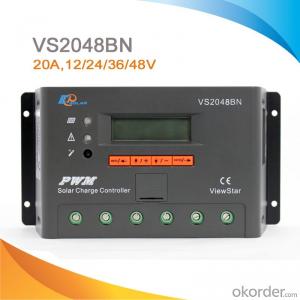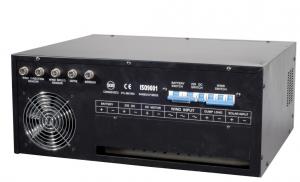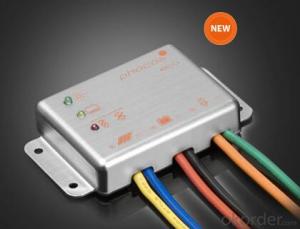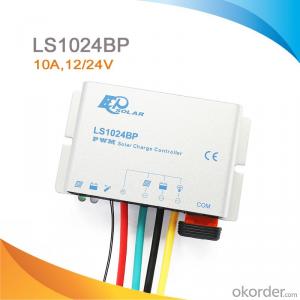Off-Grid PWM Wind Solar Hybrid Controller
- Loading Port:
- Qingdao
- Payment Terms:
- TT or LC
- Min Order Qty:
- 1 unit
- Supply Capability:
- 1000 unit/month
OKorder Service Pledge
OKorder Financial Service
You Might Also Like
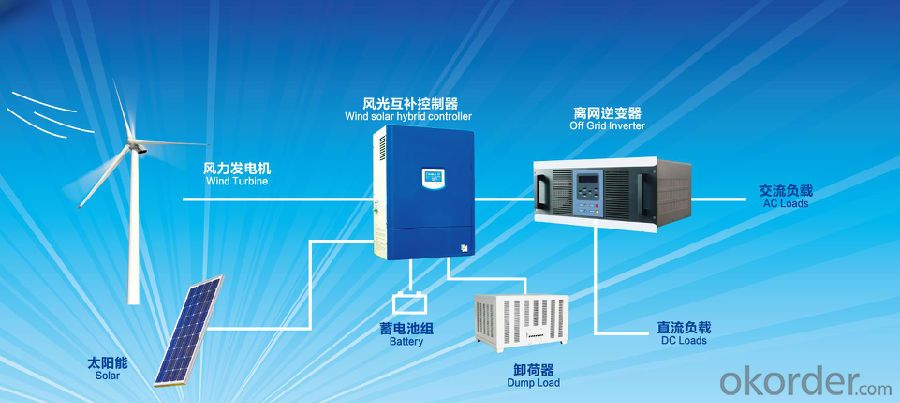
FKJ-B model Product Characteristics
◆The product is manufactured according the JB/T6939.1-2004 industrial standard and GB/T 19115.1-2003 national standard also with users’ technical requirements.
◆The big screen LCD display. Clearly present the working status of the wind turbine, solar panel, battery and controller.(Wind turbine voltage, current, power display ;solar voltage, current, power display, battery charging current, voltage, charging power, power display.)
◆Two sets of control systems:PWM constant voltage system and three-phase dump load system.
◆PWM constant voltage control is 120% of the rated power of the wind turbine. In case exceeding of PWM’s capacity, the three-phase dump load will automatically start immediately to ensure safe running of the overall wind turbine system.
◆When the battery disconnect or damage, the three-phase dump load will start automatically to avoid the wind turbine idling and runaway accident.
◆When the strong or super-strong wind conditions PWM control to ensure battery charged by the wind turbine with constant voltage and current.
◆The protection function of battery: polarity reverse protection, disconnection and damage protection.
◆Over-charging protection of the battery: When the battery is full (the battery voltage getting 125% of the rated voltage), the controller will carry out three-phase dump load automatically to stop charging the battery.
◆Auto recharging of battery: When the battery voltage reduces to 108% of the rated voltage,it stops three-phase dump load to recharge battery automatically.
◆For the different wind turbine type, the controller can be equipped with mechanical yawing, furled empennage, mechanical or hydraulic, pneumatic, electric magnetic and other brake functions.
◆The inside of the controller is equipped with surge arrester. Contain the over voltage into the wind turbine under the bearable voltage of the equipment or system. On the other way, to conduct the strong lightening current into the earth directly to avoid any damage of equipment.
◆The controller is equipped with manual three-phase dump load switch. To using this switch, the wind turbine will carry out three-phase dump load forcibly.
◆ Optional communication Mode:RS232、RS485、GPRS、USB、RJ45 ect, Can monitor multiple devices running.
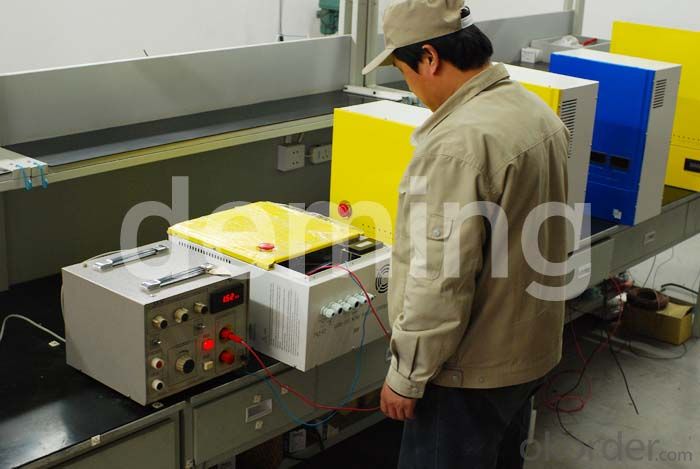
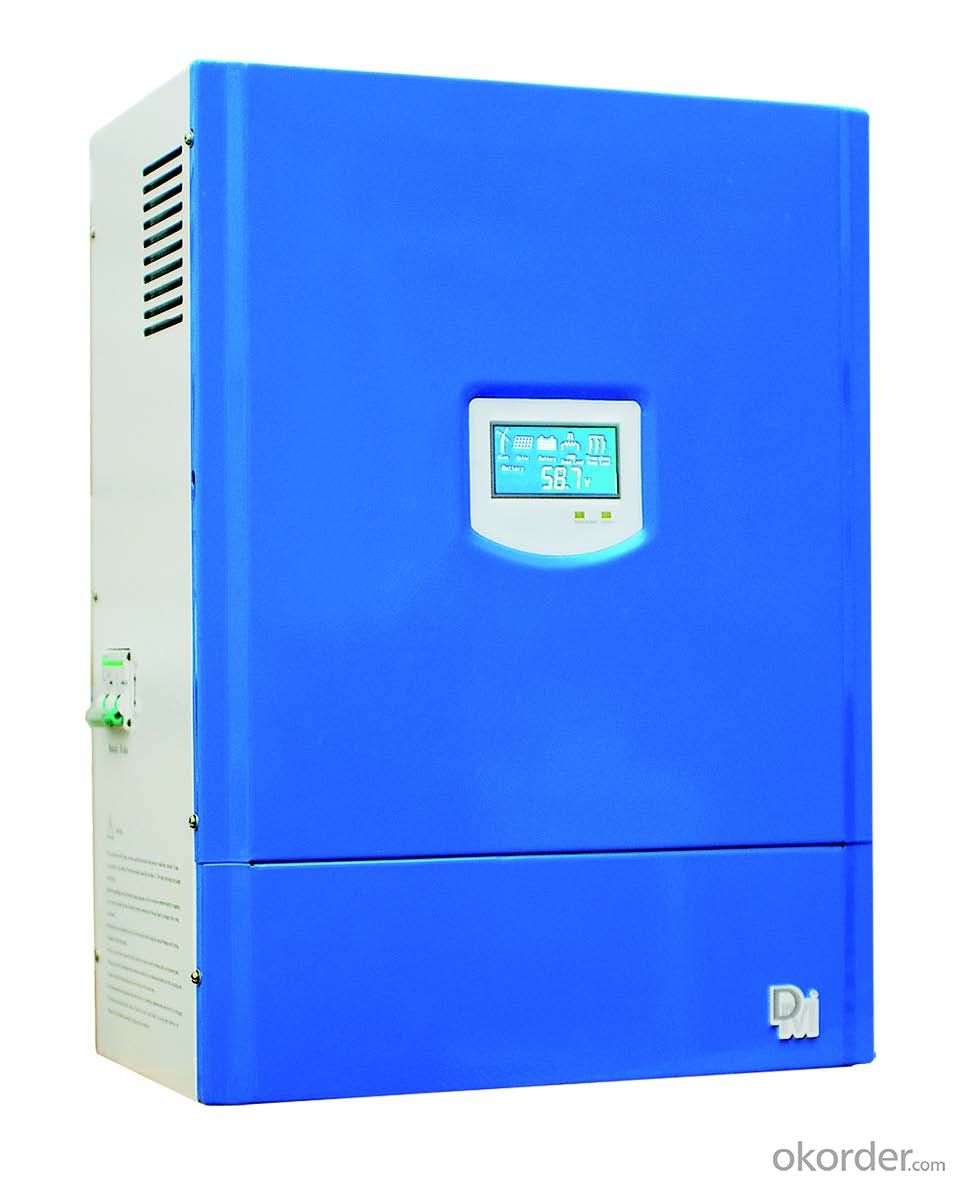
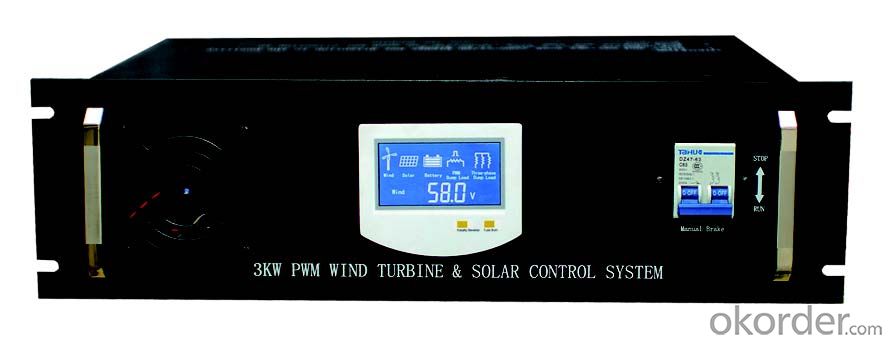
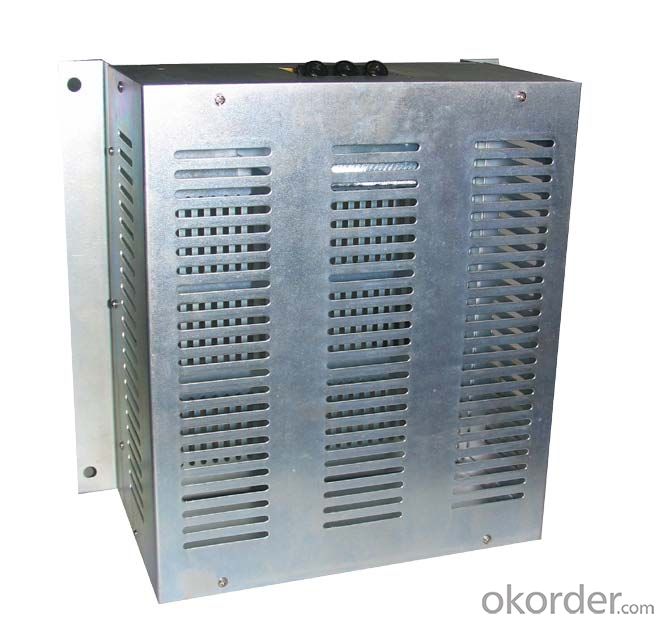
- Q: Can a solar controller be used with a solar-powered educational institution?
- Yes, a solar controller can definitely be used with a solar-powered educational institution. A solar controller is responsible for regulating the power output from solar panels and ensuring that the energy generated is efficiently utilized. In the context of a solar-powered educational institution, a solar controller would play a crucial role in managing and distributing the solar power to meet the institution's energy needs. It would help optimize the performance of the solar system, enhance energy efficiency, and ensure the reliable operation of various electrical devices and equipment within the institution.
- Q: What is the operating temperature range of a solar controller?
- The operating temperature range of a solar controller typically falls between -40 degrees Celsius to 85 degrees Celsius.
- Q: Can a solar controller be used with solar-powered medical equipment?
- Yes, a solar controller can be used with solar-powered medical equipment. A solar controller regulates the voltage and current from the solar panels, ensuring that the medical equipment receives a stable and efficient power supply. This helps in maintaining the performance and longevity of the equipment while utilizing solar energy as a sustainable power source.
- Q: Can a solar controller be used with a solar-powered agricultural research facility?
- Yes, a solar controller can be used with a solar-powered agricultural research facility. A solar controller is designed to regulate and optimize the charging and discharging of batteries connected to solar panels. In an agricultural research facility, the solar controller can efficiently manage the power generated by the solar panels, ensuring a constant and stable energy supply for various equipment and devices used in the facility. This helps in maintaining a reliable and sustainable power source for conducting research and experiments.
- Q: How do I connect a solar controller to a battery bank?
- To establish a connection between a solar controller and a battery bank, adhere to the subsequent guidelines: 1. Commence by situating the solar controller in close proximity to the battery bank, preferably within easy access to both the solar panels and the batteries. 2. Ascertain the positive and negative terminals on both the solar controller and the battery bank. Typically, the positive terminal is indicated by a "+" symbol or a red color, while the negative terminal is marked with a "-" symbol or a black color. 3. Employ a suitably sized cable or wire to link the positive terminal of the solar controller to the positive terminal of the battery bank. Guarantee that the connection is secure and firmly fastened. 4. Employ another appropriately sized cable or wire to connect the negative terminal of the solar controller to the negative terminal of the battery bank. Once again, ensure the connection is secure. 5. Thoroughly inspect all connections to verify the absence of loose or exposed wires that could potentially lead to a short circuit or other safety hazards. 6. Subsequent to confirming the security of all connections, activate the solar controller and adhere to the manufacturer's instructions to configure the settings, such as battery type and charging parameters, if necessary. 7. Regularly monitor the solar controller to ensure proper functionality and efficient charging of the battery bank. Adjust the settings as required to optimize the charging process. Always consult the manufacturer's instructions for your specific solar controller and battery bank to guarantee proper installation and operation. If uncertain about any step of the process, it is advisable to seek guidance from a professional or an experienced individual.
- Q: What is the difference between a PWM solar controller and an MPPT solar controller?
- Solar power systems utilize two different types of charge controllers: PWM (Pulse Width Modulation) and MPPT (Maximum Power Point Tracking). These controllers differ in their charging algorithms and efficiency. The PWM solar controller is a commonly used, basic charge controller. It regulates the charging process by rapidly switching the solar panel's output on and off, creating a pulsing effect. By adjusting the width of the pulses, the controller maintains a constant voltage output to the battery. However, it does not actively track the solar panel's maximum power point, which may result in a loss of efficiency. In contrast, the MPPT solar controller employs a more advanced algorithm that actively tracks the maximum power point of the solar panel. It continuously adjusts the charging voltage and current to ensure the panel operates at its maximum power output. This allows the controller to extract more energy, especially when the panel's output voltage differs from the battery bank's voltage. MPPT controllers can increase charging efficiency by up to 30% compared to PWM controllers. PWM solar controllers are generally more affordable and suitable for smaller solar power systems. They are easy to install and operate, making them popular for basic applications. However, they may be less efficient than MPPT controllers, particularly with higher voltage solar panels or mismatched voltages. MPPT solar controllers, though typically more expensive, offer higher charging efficiency and greater flexibility in system design. They can handle a wider range of solar panel and battery configurations, making them advantageous in larger systems and varying weather conditions. MPPT controllers also provide additional features like data logging, remote monitoring, and multi-stage charging, making them ideal for complex solar installations. To sum up, the key difference between PWM and MPPT solar controllers lies in their charging algorithms and efficiency. PWM controllers provide a constant voltage output but do not actively track the solar panel's maximum power point. On the other hand, MPPT controllers dynamically adjust the charging voltage and current to maximize energy harvest. MPPT controllers offer higher charging efficiency and more system design flexibility, albeit at a higher cost.
- Q: Can I connect a solar controller directly to my battery bank?
- No, it is not recommended to connect a solar controller directly to a battery bank. A solar controller regulates the charging process and prevents overcharging, which is crucial for the longevity and performance of the batteries. Connecting it directly to the battery bank may result in damage to the batteries and reduced efficiency of the solar system.
- Q: Can a solar controller be used with a solar panel cleaning system?
- Yes, a solar controller can be used with a solar panel cleaning system. A solar controller is responsible for regulating the flow of electricity from the solar panels to the batteries or grid. It ensures that the solar panels operate at their maximum efficiency and protects the batteries from overcharging. Since a solar panel cleaning system is typically connected to the solar panels, a solar controller can be used to monitor and control the power flow during the cleaning process, ensuring the system operates safely and effectively.
- Q: Can a solar controller be used with different types of solar panels?
- Yes, a solar controller can be used with different types of solar panels as long as the controller's specifications and capabilities align with the requirements of the specific type of solar panel being used.
- Q: Can a solar controller be used with solar panel tracking systems?
- Yes, a solar controller can be used with solar panel tracking systems. A solar controller is responsible for regulating the voltage and current flowing between the solar panels and the battery or load. By using a solar controller, the solar panel tracking system can effectively manage and optimize the power output from the solar panels, ensuring efficient charging and preventing overcharging of the battery.
Send your message to us
Off-Grid PWM Wind Solar Hybrid Controller
- Loading Port:
- Qingdao
- Payment Terms:
- TT or LC
- Min Order Qty:
- 1 unit
- Supply Capability:
- 1000 unit/month
OKorder Service Pledge
OKorder Financial Service
Similar products
Hot products
Hot Searches
Related keywords
